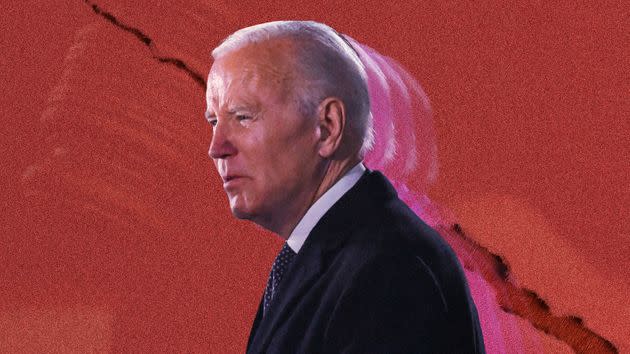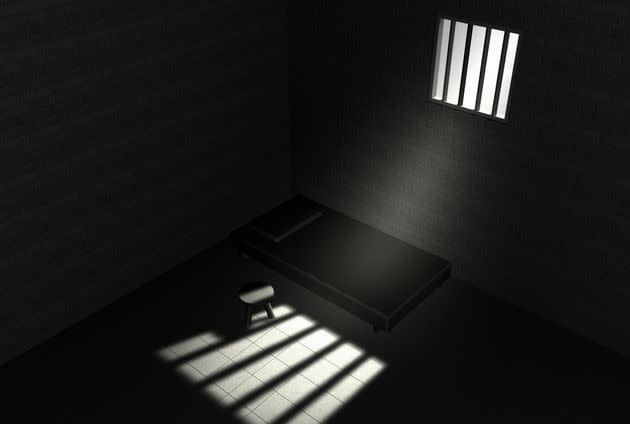Biden Made A Big Promise On The Death Penalty — But He Hasn’t Delivered
- Oops!Something went wrong.Please try again later.
- Oops!Something went wrong.Please try again later.
- Oops!Something went wrong.Please try again later.
President Joe Biden made history in 2021 when he became the first president to publicly oppose the death penalty. It wasn’t a position he spoke about often but tucked into his campaign platform was a promise to work with Congress to abolish the federal death penalty through legislation and incentivize states to do the same.
In July 2020, the Trump administration ended a 17-year de facto moratorium on federal executions and killed Daniel Lewis Lee. Over the next several months, former President Donald Trump and then-Attorney General William Barr raced to execute as many people as possible before leaving office. Dustin Higgs, a Black man scheduled to be executed on Martin Luther King Jr.’s birthday, was the thirteenth and final person to be killed. Ultimately, he died in the early hours of the following day while suffering from COVID-19, just four days before Biden’s inauguration. Like many of the people executed before him, there were extensive unresolved legal issues in Higgs’ case.
For death penalty abolitionists still reeling from that unprecedented execution spree, Biden’s stated policy — however discreet — provided a glimmer of hope. But two years later, the Biden administration has taken almost no public action towards eliminating the death penalty. Although the Justice Department has reinstated the execution moratorium and reduced the number of death sentences it is seeking, it is actively defending existing death sentences and even working on expanding death row.
Already dim hopes of Congressional action have stalled with the Republican takeover of the House of Representatives during the midterm elections. Meanwhile, Trump and Florida Gov. Ron DeSantis, currently the 2024 GOP frontrunners, have both campaigned on expanding the use of capital punishment.
The threat of a capital punishment enthusiast returning to the White House has the abolitionist community hoping Biden will grant clemency to those on federal death row before leaving office — or that the Justice Department will at least stop seeking and defending death sentences.
“If you don’t execute anyone, but you usher them all into a President Trump or a President DeSantis, what have you done?” Ruth Friedman, the Federal Capital Habeas Project director, said in an interview with HuffPost. “That’s far from clean hands. Quite the opposite.”

President Joe Biden campaigned on abolishing the federal death penalty. Since entering office two years ago, he has taken almost no public action to fulfill that campaign promise.
Stalled Legislation
By the time Biden entered office, Senate Judiciary Chairman Dick Durbin (Ill.) and Rep. Ayanna Pressley (D-Mass.) had already reintroduced a death penalty abolition bill that had stalled in the previous Congress. But even with Democrats narrowly controlling the House and Senate, the bill failed to gain traction. Less than half of the Democrats in each chamber signed on as co-sponsors, and the bill never made it out of the Senate Judiciary Committee, chaired by Durbin.
A Democratic Judiciary Committee aide, who was not authorized to speak on the record, cited lack of Republican support as the main obstacle to moving the death penalty abolition bill forward, noting that even when Democrats controlled both chambers of Congress, they did not have the votes to overcome a filibuster. Asked about the lack of widespread Democratic support for the bill, the aide said she was unaware of members having “substantive” issues with the bill and suggested it could be an issue of staff not having time to get sign-off from their boss. Asked if the bill’s sponsors had asked the White House to help get Democratic lawmakers on board, the aide said she did not know.
The White House declined to answer a question about whether they worked to shore up Democratic support for the bill.
Durbin said in a statement that he planned to reintroduce legislation to ban the death penalty this summer. He described the death penalty as “an inhumane, failed policy disproportionately imposed on Black and brown and low-income individuals” and urged Republicans to support the abolition legislation.
Executive Inaction
There are plenty of steps the executive branch could take to make future executions less likely, even without Congress banning the practice. Death penalty abolitionists told HuffPost during the early days of Biden’s presidency they hoped he would use his clemency power to commute the sentences of everyone on federal death row as a failsafe against Congressional inaction.
“Someone who was at all outraged by how horrific and barbaric this has been should just commute the row,” Jessica Brand, a Texas Defender Service board member, said at the time, referring to the 13 executions under Trump.
In July 2021, about a year and a half into the Biden administration, Attorney General Merrick Garland issued a formal moratorium on federal executions while the Justice Department reviewed death penalty policies and procedures. It was a modest measure, an effective return to the status quo during George W. Bush’s second term.
A group of Senate Democrats led by Durbin urged Garland to go further, calling on him to withdraw all notices of intent to seek the death penalty and authorize no new death notices during the review. The lawmakers’ August 2021 letter referenced Biden’s campaign promise and noted that Vice President Kamala Harris was an original co-sponsor of the death penalty abolition bill when she was in the Senate. A different Judiciary Committee aide said that the DOJ responded to the letter but declined to share the response.
So far, the Justice Department has not sought the death penalty in any new cases since Biden entered office and has backed away from pursuing the death penalty against 27 defendants whose cases began under previous administrations. But under Garland, the DOJ unsuccessfully fought to send Sayfullo Saipov to death row as punishment for killing eight people on a bike path in Manhattan in 2017. Moreover, the Justice Department continues to fight to uphold “every single one” of the existing death sentences, Friedman said.
When defense lawyers try to introduce evidence that their client has an intellectual disability, which would make them ineligible for a death sentence, Justice Department lawyers fight their ability to present that evidence in court, Friedman said. When they try to show evidence that their clients had ineffective lawyers or were harmed by racist jury selection practices at trial, DOJ lawyers work to block that, too, she said.
“You still have a row of 42 people, and you know their cases are problematic, you know it,” Friedman continued, referring to the Justice Department under Garland. “So, how are you different? What’s different about you?”
The Justice Department did not respond to multiple requests to answer a detailed list of questions. It told The Associated Press in March it had not agreed with a single claim of racial bias or an error that could lead to a federal death sentence being overturned.
Both Biden and Garland have acknowledged the well-documented fact that people of color, specifically Black people, are disproportionately sentenced to death. During his confirmation hearing, Garland criticized the “increasing almost randomness or arbitrariness of its application.” Although Black people represent about 13% of the U.S. population, they account for 40% of the people on federal death row, according to the Federal Capital Habeas Project. There are still people on federal death row who were convicted and sentenced by all-white juries.

So far, the Justice Department has not sought the death penalty in any new cases since Biden entered office and has backed away from pursuing the death penalty against 27 defendants whose cases began under previous administrations.
Lives In The Balance
With the midterm elections behind him and his 2024 reelection campaign fast approaching, it’s unclear what, if anything, Biden plans to do about the death penalty. The White House declined to answer a detailed list of questions, including, “What has the Biden administration done since entering office to end the federal death penalty?” and “Has the White House lobbied lawmakers to support [the death penalty abolition] bills?”
Instead, a White House spokespersonsaid in a statement that Biden “has long talked about his concerns about how the death penalty is applied and whether it is consistent with the values fundamental to our sense of justice and fairness” and that he supports Garland’s decision to issue a moratorium and conduct a review.
While the president remains silent and the Justice Department works quietly to keep people on death row, the leading Republican presidential contenders are seemingly fighting to outdo one another in their pro-execution stances. Trump has repeatedlycalled for drug dealers to be given the death penalty, a suggestion that likely violates constitutional protections against cruel and unusual punishment. As governor, DeSantis has dramatically expanded the potential use of the death penalty in Florida, signing bills that allow non-unanimous juries to impose a death sentence and allowing the death penalty for certain sex crimes against kids, even if the victim does not die. Both laws are likely to be challenged in court.
Most of the people currently on death row lost someone they were close to during the executions under Trump. With Biden’s silence on the matter and the 2024 election approaching, some are left wondering if they will be next to die.
“Trump ran out of time during his killing spree,” Rejon Taylor, who is on federal death row, told The Associated Press earlier this year. “If elected again, “I don’t think he’d waste any time in continuing where he’d left off.”
